Dropbox is one of the earliest and most popular cloud storage platforms, launched in 2008. It stood the test of time and is still used by millions of users for secure file sharing and collaboration.
However, its limited free storage space of 2 GB (in the free account) and questions related to file security made me look for better alternatives. Dropbox was subjected to multiple leaks and security issues, including
- 130 code repositories were stolen in 2024 via phished employee credentials[1]
- Customer data leak and breach of Digital Signature Service Dropbox Sign[2]
I’ve researched, reviewed, and tested 17+ alternative cloud storage services to Dropbox and shortlisted the 13 best solutions. Make sure to check out how I tested the platforms on their speed and performance during uploads.
I’ll discuss the following 9 best Dropbox alternatives out of the 13 that I’ve shortlisted. 👇🏼
- 1. Zoho WorkDrive
- 2. Sync
- 3. Box
- 4. Google Drive
- 5. Internxt
- 6. Jottacloud
- 7. NordLocker
- 8. pCloud
- 9. Tresorit
- Show less
Note: You can increase Dropbox storage to 16GB by referring to friends. For each referral, you get 500 MB. Not everyone will do it, so it is not considered when comparing Dropbox’s free storage with its alternatives.
You can trust Geekflare
At Geekflare, trust and transparency are paramount. Our team of experts, with over 185 years of combined experience in business and technology, tests and reviews software, ensuring our ratings and awards are unbiased and reliable. Learn how we test.
Best Dropbox Alternatives Comparison
First, let’s take a look at the chart below. It visualizes the time taken by the tools to upload an MP4 file (based on my testing methodology). This gives you a glance at their performance capabilities.
As you can infer from the chart, the lower the time taken for uploading, the better the tool’s performance.
In the following table, I’ve compared the tools based on their free plan, storage, security, pricing, and features.
| Platforms | Free Plan, Available Storage | Security | Pricing | Key Features |
|---|---|---|---|---|
| Dropbox | ✅ 2 GB | 2FA, 256-bit encryption, SSL/TLS, GDPR compliant | $9.99/month | Cross-platform sync, Dropbox Paper, Offline access |
| Zoho WorkDrive | ✅ 5 GB | Encryption at rest and during transfer, GDPR compliance, role based access control, 2FA | $2.50/user/month | Real-time collaboration, advanced file usage analytics, Zoho ecosystem integration |
| Sync | ✅ 5 GB | Zero-knowledge encryption, advanced sharing feature, hiding URL | $5/month | Wide support for third-party apps, easy collaboration via centralized folders |
| Box | ✅ 10 GB | 2FA, AES 256-bit encryption, TLS/SSL | $10/month | Box Canvas, workflow automation, feature-rich admin tools, versioning |
| Google Drive | ✅ 15 GB | 2FA with AES 256-bit encryption, recovery options, user permission | $1.99/month | Google ecosystem integration, offline access, sync across devices |
| Internxt | ✅1 GB | Zero-knowledge support, end-to-end encryption, GDPR-compliant | $15/month | Open-source, scatters files across servers, user-friendly interface |
| JottaCloud | ✅ 5 GB | HTTPS, 2FA, AES-256 bit encryption, data servers in Norway | $11.99/month | Web interface, MS office compatible, Seamless cross-platform syncing |
| NordLocker | ✅ 3 GB | AES-256, xChaCha20-Poly 1305 and ED25519 encryption | $2.99/month | Link expiration, end-to-end encryption, intuitive interface |
| pCloud | ✅10 GB | Client-side encryption, file password protection, TLS/SSL | $49.99/year | Excellent link sharing options, 30 days file versioning, lifetime plans |
| Tresorit | ✅ 3 GB | Zero-knowledge privacy, TLS/SSL, AES-256 bit encryption | $4.75/month | Access files from anywhere, encrypt mail via free email plugin, GDPR compliant |
Below, I’ve reviewed various Dropbox alternatives in detail, including my testing experience and their pricing.
1. Zoho WorkDrive
Zoho WorkDrive is a team-focused storage solution aimed at businesses for easy storage, collaboration, and sharing. It is free (5 GB storage limit) and supports 220+ file formats with an easy preview option.
The platform provides comprehensive storage compared to Dropbox through excellent collaborative features and focuses on streamlining team workflows. Teams already utilizing Zoho can benefit from seamless Zoho app integrations.
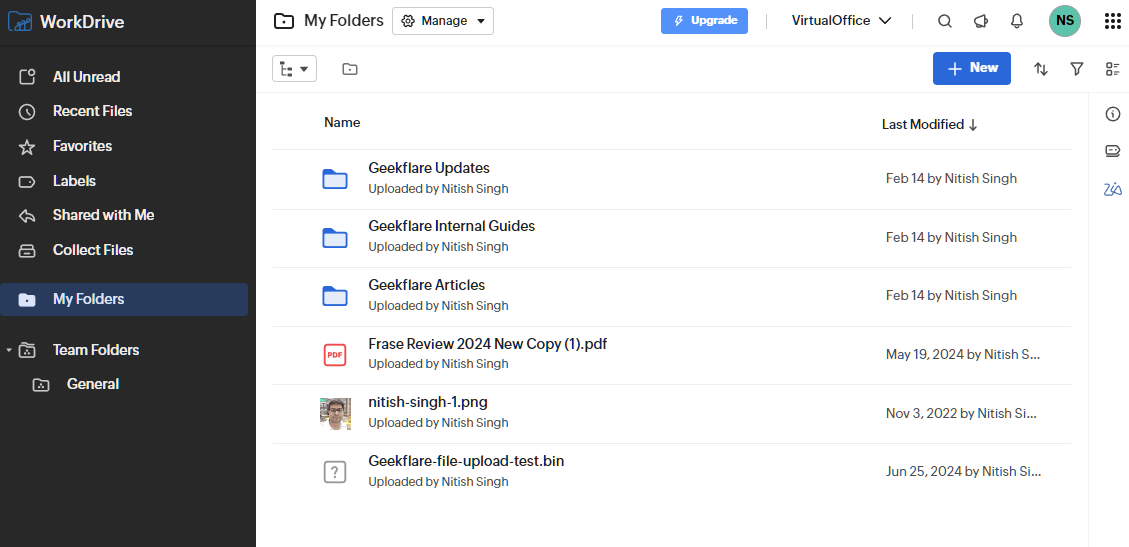
As an Admin, you can create a new team or work with existing VirtualOffice. However, the team plans are paid from the get-go. To help try their service, Zoho offers a 15-day free trial for WorkDrive.
They also get to manage team folders, assigning proper roles to members with sub-level and higher permissions or even document-specific permissions—all from the Admin Console.
I found Zoho WorkDrive to provide an intuitive and accessible dashboard. However, if you’ve been using Dropbox for a while, Zoho’s offering will take a bit longer for you to get accustomed to. Zoho also ensures a high level of security by using encryption to transmit customers’ data.
In my test, I found Zoho WorkDrive to perform well. Following are my findings:
- 211 MB MP4 video – 23 seconds
- 1.5 MB PNG – Instantly
- 1.2 MB PDF – Instantly
Zoho WorkDrive comes with a desktop app and mobile app for Android and iOS (iPhone/iPad).
Zoho WorkDrive Limitations
- Mobile app features are limited compared to the desktop version
- Slight learning curve for new users
Zoho WorkDrive Pricing
Zoho WorkDrive follows a freemium price model. Its individual plan is free of cost with a 5 GB storage limitation (3 GB more than Dropbox). The paid plans start from $2.50/user/month (way cheaper compared to the Dropbox starter plan).
2. Sync
Sync is a minimalist cloud storage platform that excels at link sharing and collaborative features. Like Dropbox, you can create a free individual account, but with a 5 GB limit (which can be increased by 1 GB more by performing simple tasks such as creating folders and installing desktop apps).
The most significant advantage of Sync is its encryption method, which offers zero-knowledge encryption. This means Sync always encrypts data even before leaving the origin device (end-to-end encryption).
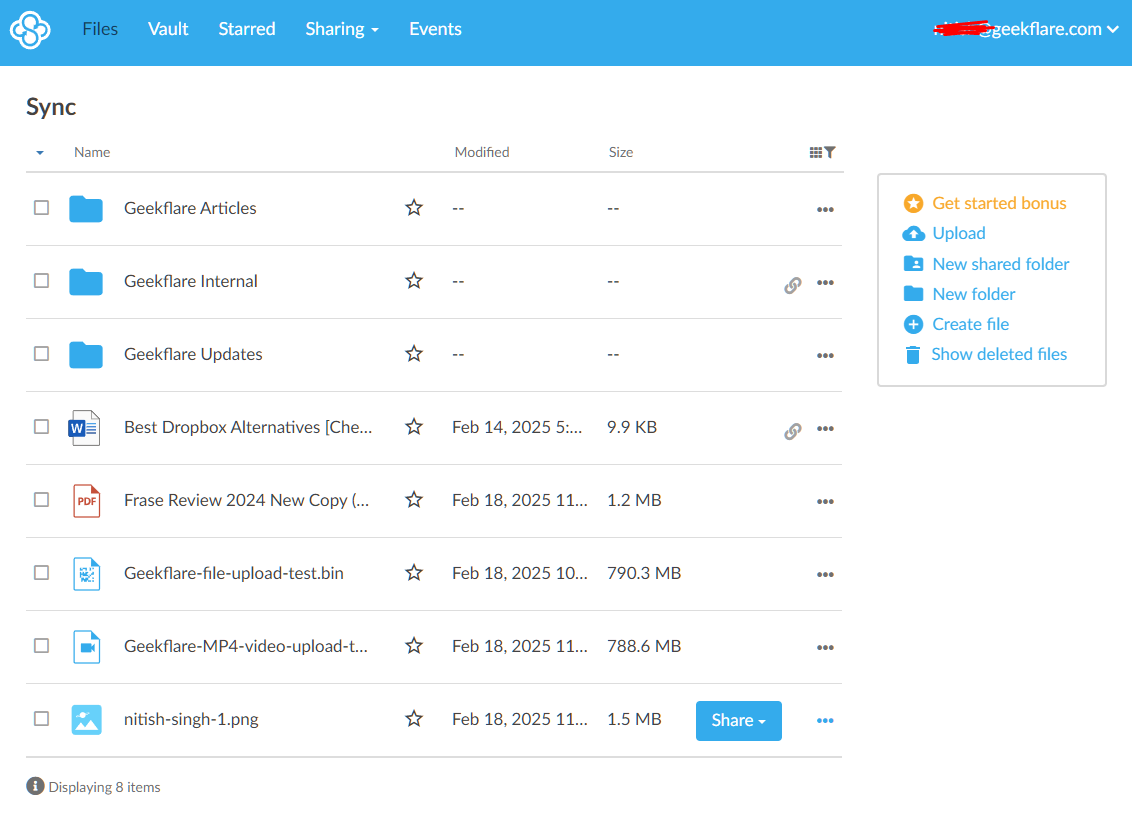
Another aspect that Sync does well is sharing. It offers advanced sharing features that let you directly share the file/folder with the recipient’s email address. This hides the URL and hence stops any leaks (as Sync encrypts the link address). However, the recipient must have a Sync account to access it.
Dropbox is also strong in the sharing department, but it lacks advanced or additional settings like Sync.
Both Sync and Dropbox offer selective syncing, ensuring that they only sync files you select.
In my test, I found Sync to be slower than its competitors. Following are my findings:
- 211 MB MP4 – 65 secs
- 1.5 MB PNG – 4 secs
- 1.2 MB PDF – 5 secs
As for apps, Sync offers Desktop and macOS desktop integration. It supports mobile apps for iPhone, iPad, and Android.
Sync Limitations
- It lacks the Linux app that Dropbox offers
- It doesn’t support third-party integration for Google Apps such as Docs, Sheet, etc, but supports integration to Microsoft Office Online.
Sync Pricing
Sync offers a forever free plan with 5 GB storage limitations. The free plan has limited features, especially regarding link sharing. Its paid plans start at $5/month for personal use (200 GB storage) and $6/user/month (1 TB secure storage) for Business plans.
3. Box
Box is one of the best Dropbox alternatives for business, with access to features like e-sign and Box Canvas—a visual collaboration tool where teams can use the dashboard to share ideas in real-time.
Box doesn’t disappoint in the individual category either, offering 10 GB of free storage (5 times more than Dropbox). However, it is limited by two key aspects: you can upload only one version of each file, and there’s a 250 MB file upload limit.
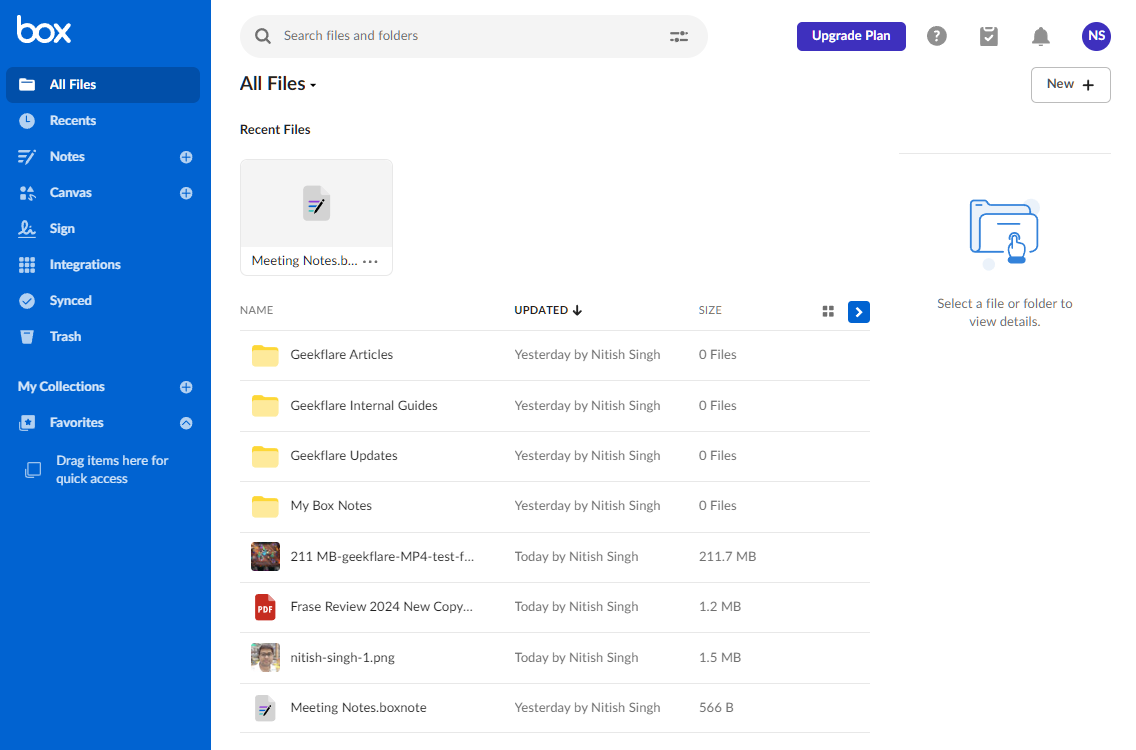
Like Dropbox, Box has Google Suite and Office 365 integration, which makes it easy to work on your content. It also offers a desktop app that improves file uploads and makes them more manageable.
Regarding note-taking, both Dropbox and Box have something to offer. Box offers Box Notes, a collaborative real-time environment, whereas Dropbox has Dropbox Paper.
In my test, I found Box to offer decent performance. Following are my findings:
- 211 MB MP4 video – 29 secs
- 1.5 MB PNG – 3 secs
- 1.2 MB PDF – 2 secs
I recommend Box for unlimited storage space and private encryption on their business plans. Individuals can also find Box more preferable with its 10 GB storage space.
Box Limitations
- Doesn’t support Block-level sync (where the service only copies the section where the changes occurred rather than the entire file); makes changes/upload slower
- Doesn’t offer support for free users
- Free tier has limited features
- Slightly more expensive than the competition
Box Pricing
Box Free Plans offer 10 GB storage, with paid plans starting at $10/month and offering 100 GB of storage. Its Business plans start at $15/user/month and come with unlimited storage, plus an upload file size limit of 5 GB.
4. Google Drive
Google Drive is one of my favorite Dropbox alternatives.
I’ve been using Google Drive for over a decade because of its generous 15 GB free plan and easy integration with Google apps.
However, the space is shared across the entire Google account (including email attachments, photo backup, and recovery), which is not the same for Dropbox.
Google Drive’s interface is well-designed, with access to Calendar, Keep, Tasks, and Contacts. It supports a wide variety of add-ons, which makes it easy to use third-party business apps like Canva, Lucidchart, Miro, Peak Deck, and many more.
Google’s storage solution doesn’t support block-level sync, making Dropbox a better choice for users who work with large files.
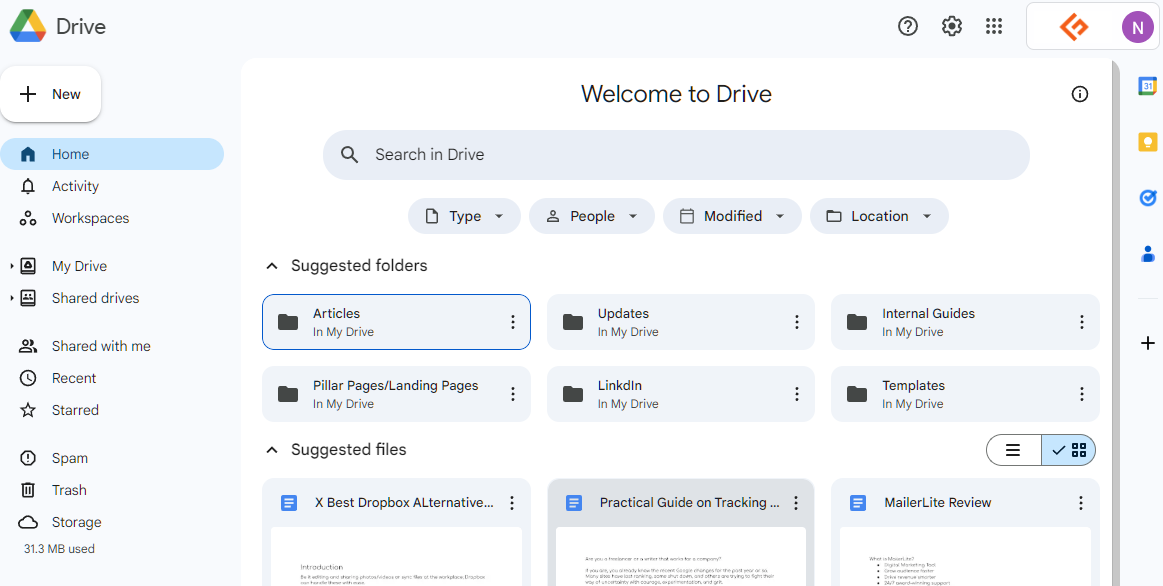
Security-wise, Google Drive is similar to Dropbox. NSA snooped on Google’s traffic in 2013[3], whereas Dropbox saw a data breach in 2024 and did not inform their users about previous data breaches.
I recommend Google Drive to users who use collaborative tools such as Docs and Slides. The Google ecosystem, such as Meet and Gmail, also helps teams to stay connected (Google Workspace required).
In my test, I found Google Drive to be fast. Following are my findings:
- 211 MB MP4 video – 26 secs
- 1.5 MB PNG – Instantly
- 1.2 MB PDF – Instantly
Google Drive offers apps for desktop and mobile (Android and iOS).
Google Drive Limitations
- It doesn’t support block-level sync, selective sync, or offer bandwidth management
- Doesn’t use zero-knowledge encryption method
- No telephone support
- No Linux app
Google Drive Pricing
Google Drive offers a free plan for individuals with 15 GB of storage space (shared across email and photos). Its paid plan starts at just $1.99 per month, which offers 100 GB storage, followed by a $9.99 premium plan with access to 2 TB storage. You can save up to 16% if you go for an annual subscription.
5. Internxt
Internxt is an open-source cloud storage provider. Its open-source nature makes it one of the safest cloud Dropbox competitors, with support for zero-knowledge methods and GDPR compliance.
However, Internxt is not generous when it comes to storage space for free individual plans, offering only 1 GB of storage (previously, it was 10 GB until July 2024).
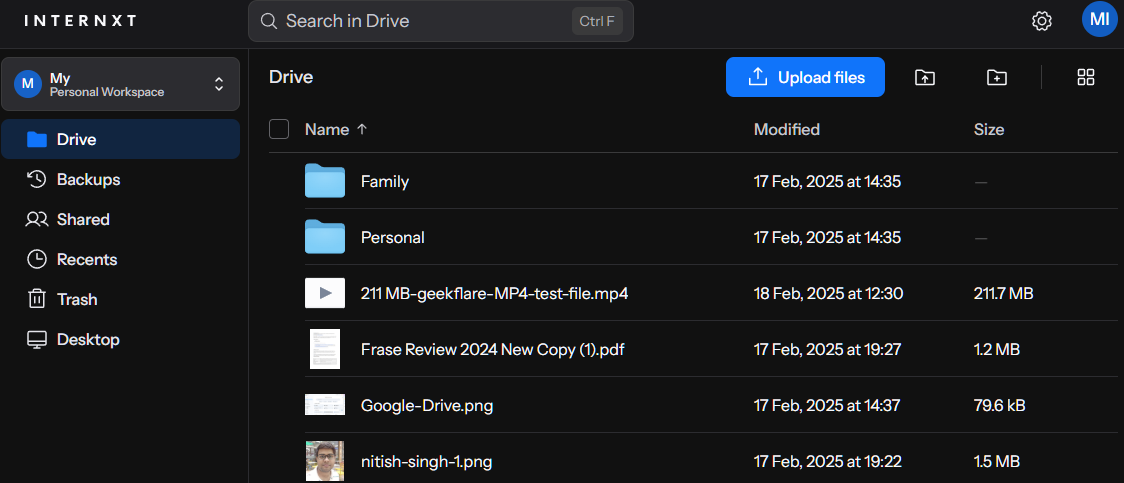
Security-wise, Internxt is robust (again, due to it being open-source). Developers and security experts can scrutinize the code. The platform scatters file shards across servers, adding another security layer. This is a considerable step up compared to Dropbox.
However, from a regular user perspective, both provide the same level of security. Users can enable two-factor authentication (2FA) and also create a backup key to ensure full access even when they forget their password.
I found the Internxt user interface intuitive and easy to use. You can upload files easily from your local PC to the cloud.
In my test, I found Internxt to perform decently. Following are my findings:
- 211 MB MP4 – 31 secs
- 1.5 MB PNG – 2 secs
- 1.2 MB PDF – 5 secs
If you’re looking for the free plan, I don’t recommend Internxt, considering it only offers 1 GB of storage space. However, it is very secure and hence recommended for businesses that work with sensitive data.
Internxt Limitations
- Slow upload speeds compared to peers due to security protocols
- Collaboration is not seamless due to extra security steps
- Lack of advanced sharing features
Internxt Pricing
Internxt free plan offers 1 GB storage. Its paid plan starts at $15/month with 200 GB of storage space. It is also one of the few cloud storage providers that offers a lifetime subscription starting at $149.85.
6. Jottacloud
Jottacloud offers a plan with unlimited storage. However, it does throttle speeds after you cross 5 TB.
It focuses on providing photo storage to ensure complete protection with backup and proper sync capabilities. You can take full advantage of its unlimited storage as it doesn’t compress your images, ensuring original image quality at all times. To make searching easy, Jottacloud offers AI photo search.
However, in my test, I found Jottacloud to perform decently. Following are my findings:
- 211 MB MP4 – 32 secs
- 1.5 MB PNG – 3 secs
- 1.2 MB PDF – 3 secs
For business, Jottacloud is a good option, considering its unlimited storage, which Dropbox lacks. As for ease of use, JottaCloud is beginner-friendly and has a clean interface.
It does impose limitations on sharing folders and files. Folders can only be shared among other Jottacloud account holders. However, there is no such limitation for files, which can be shared publicly.
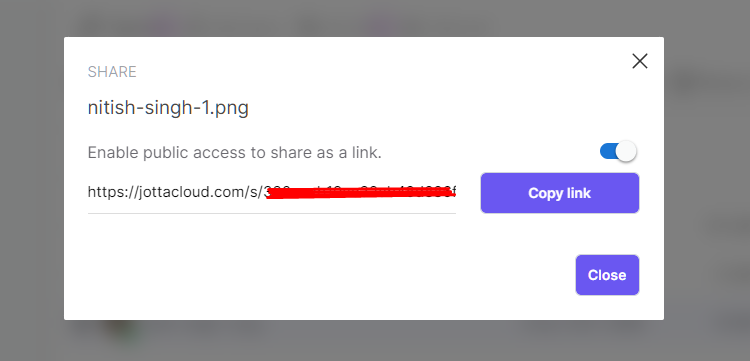
Jottacloud cannot securely share files, folders, or photos. In comparison, Dropbox offers sharing via password-protected links with the option to set expiry dates as well.
Like Dropbox, Jottacloud also supports Microsoft Office. However, it lacks other major integration options, denting your productivity levels. For command line users, it offers a CLI, which lets you automate backup folders. The CLI works with Mac, Windows, Linux, NAS devices, and Raspberry Pi.
Jottacloud Limitations
- No zero-knowledge encryption support
- Considerably slow speeds
- Speed throttle for unlimited storage after you cross 5 TB
- No support for block-level sync or copy
Jottacloud Pricing
Jottacloud’s free plan has a 5 GB limit and offers email and chat support. Its paid plan starts at $11.99/month, offering unlimited storage (with upload speed throttled after 5 TB).
7. NordLocker
NordLocker is my favorite cloud storage provider for storing sensitive data online. It is developed by Nord Security, the same developers as NordVPN’s virtual private network, and hence has a great online reputation regarding security and privacy.
It offers a 3 GB free storage plan for individual users, which is not much but is good enough to store sensitive files.
Setting up NordLocker is not similar to Dropbox or its alternatives. As NordLocker uses zero knowledge, it generates a cloud recovery key during account creation. So, if you lose your password, you’ll need to use the key to recover it. However, if you lose the key, you’ll permanently lose access to your account.
I found NordLocker to offer a modern user interface with a focus on accessibility and sharing.
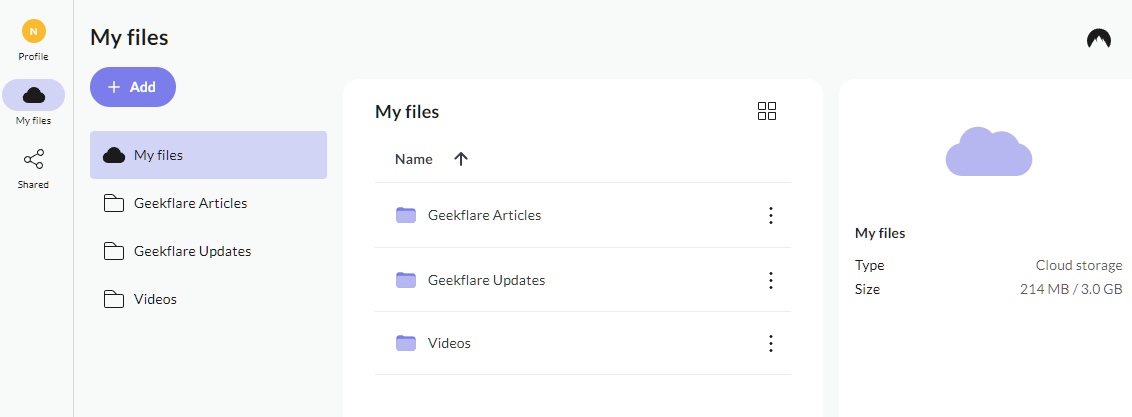
As NordLocker is security-focused and uses AES-256, xChaCha20-Poly 1305, and Ed25519 algorithms, uploading files can take time due to end-to-end encryption. Following are my findings:
- 211 MB MP4 – 37 secs
- 1.5 MB PNG – 10 secs
- 1.2 MB PDF – 8 secs
Despite the slow speeds, I can adjust to it, considering the level of security you get with NordLocker.
You can share your files securely with others using security codes and specific links generated to access them. It also adds link expiration.
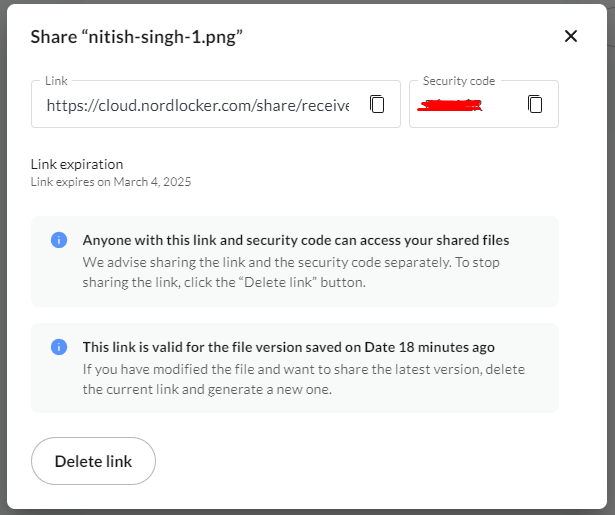
The platform supports cross-platform sync and major platforms, including Android, iOS, and Windows, similar to Dropbox.
NordLocker Limitations
- Lacks collaborative features
- No documentation integration features
- Short-term plans are expensive
- Limited customer support
NordLocker Pricing
NordLocker’s free plan has 3 GB of free cloud storage with email support. The paid plan starts at $2.99/month (500 GB, billed yearly), which is reasonable for the first year. They offer a 30-day money-back guarantee.
NordLocker is also available as NordVPN’s Complete bundle, which consists of NordVPN, NordPass, and NordLocker.
8. pCloud
pCloud stands as a great alternative to Dropbox, with many similarities between them. Out of the box, you get a modern interface with a focus on usability.
It offers a 10 GB free space where 3 GB storage space is available instantly, and an additional 7 GB is available for those who perform simple tasks such as verifying email, uploading files, or inviting friends.
The key difference between pCloud and Dropbox is the use case. pCloud, with its security feature, aims to provide a safe and secure place to store your sensitive files.
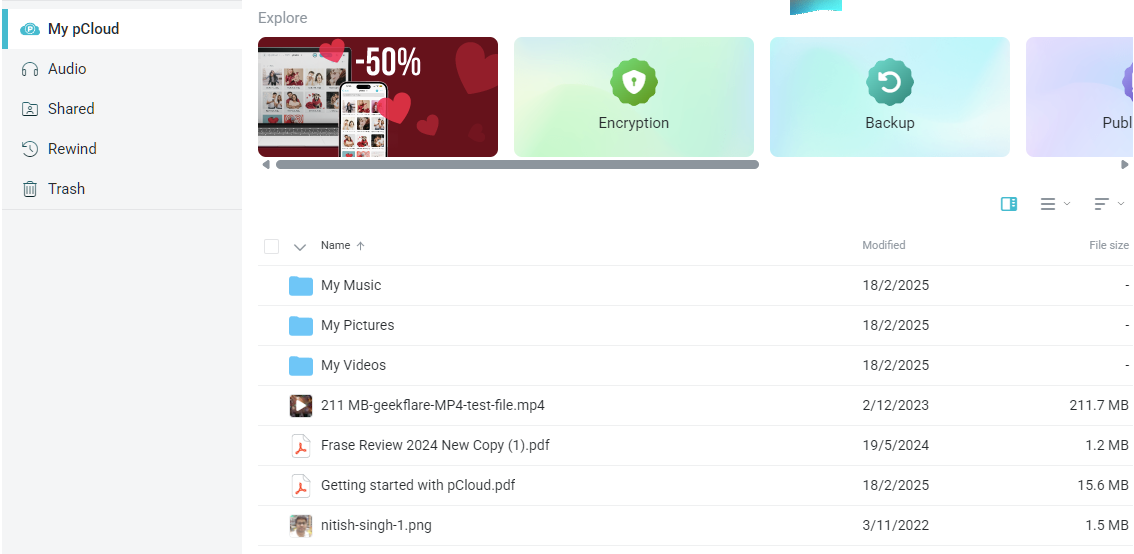
pCloud offers a private encryption folder called pCloud Crypto (paid add-on). Dropbox, on the other hand, focuses on productivity and collaboration via integration with third-party apps.
When it comes to file sharing, pCloud does a good job of offering options like password protection, expiration date, and branding, which are available via a paid plan. You can also invite users to the folder via email only.
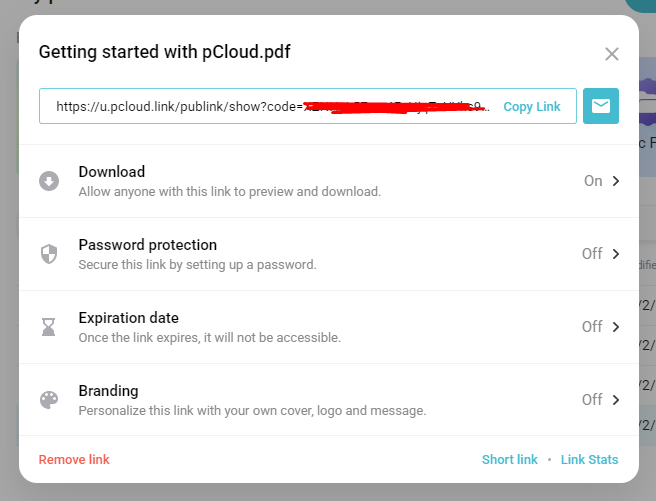
As expected, due to the use of security protocols, it can take more time to upload bigger files. However, smaller files are instantly uploaded. Following are my findings:
- 211 MB MP4 – 38 secs
- 1.5 MB PNG – Instantly
- 1.2 MB PDF – Instantly
Another significant difference between pCloud and Dropbox is in their native apps. Dropbox gives access to multiple in-house apps, including Dropbox Paper, Relay, and Capture. pCloud offers pCloud Transfer and pCloud Pass.
I recommend pCloud for users who want to use it for private encryption, version history, and file restoration.
pCloud Limitations
- Doesn’t support link download limits
- No support for Google Docs, Office Online, and Notes App
- No 24/7 customer support or Live chat option
pCloud Pricing
pCloud’s free forever plan offers 10 GB of space. Its paid plan starts at $49.99 yearly, offering 500 GB of space. There’s also a lifetime plan starting at $199 (100 GB storage).
9. Tresorit
Tresorit is an excellent paid-only alternative to Dropbox that focuses on security. On the other hand, Dropbox is more focused on productivity and collaboration.
With Tresorit, you get a basic free plan with 3 GB of encrypted cloud storage. It limits maximum file size to 500 MB and supports just 2 devices. Tresorit Send is also a free service that lets you send files up to 5 GB for free.
In my tests, I found Tresorit to be the slowest among Dropbox alternatives. Following are my findings:
- 211 MB MP4 file: 114 secs
- 1.5 MB PNG: 7 secs
- 1.2 MB PDF: 7 secs
The slow performance can be attributed to its end-to-end encryption, but I think there is a huge scope for improvement in speeds.
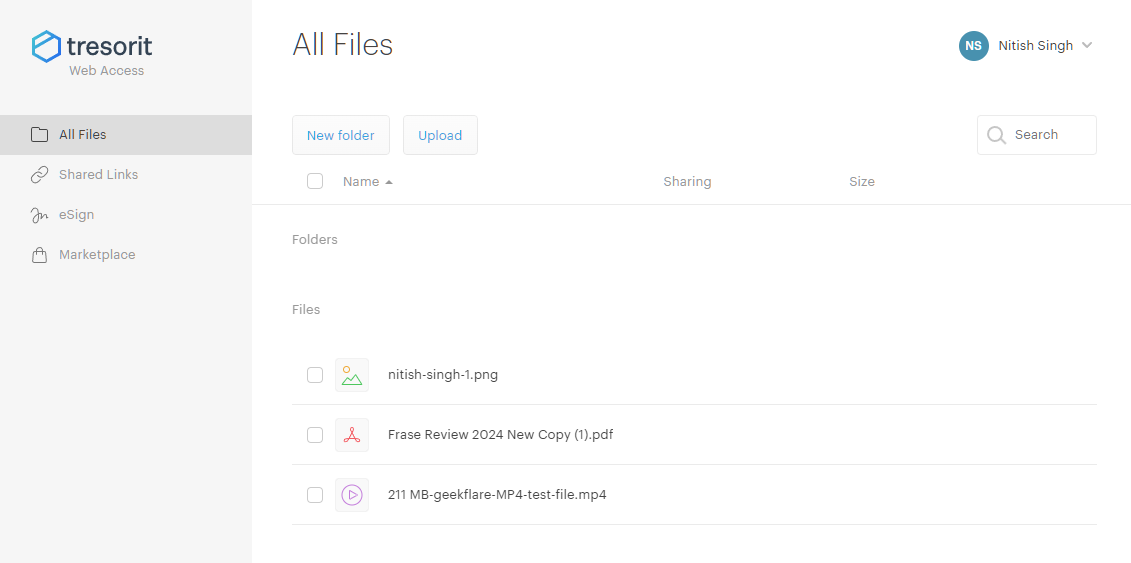
Tresorit uses AES-256 encryption, TLS/SSL, and a zero-knowledge privacy model. It’s headquartered in Switzerland, which is known for its excellent digital privacy laws. In comparison, Dropbox lacks zero knowledge and also collects users’ data.
Both Tresorit and Dropbox support versioning. However, the Tresorit free plan has no versioning support, whereas the Personal plan only supports 10 versions. In comparison, Dropbox does a better job, with every plan supporting unlimited versioning.
Dropbox also beats Tresorit in third-party integrations, especially in productivity and collaboration. This is due to Tresorit’s strong security and encryption, which severely limits the number of allowed integrations.
I’d only recommend Tresorit to individuals and businesses looking for strong private encryption and secure file sharing.
Tresorit Limitations
- Limited file revisioning
- Expensive plans
- Slow upload speeds
- No support for block-level sync
- Lacks folder permissions
Tresorit Pricing
Tresorit Basic is a free plan with 3 GB of encrypted storage. You can try any of its individual or business paid subscription tiers via its 14-day trial (credit card required). Their paid plans start at $4.75/month (billed annually).
Honorable Mentions
While I tested 13 solutions in total, I’ve only discussed the top 9, which I considered worth mentioning. Here are the other 4 Dropbox alternatives that you can check out.
| Dropbox Alternative | About the Software |
|---|---|
| 10. MEGA | Offers 20 GB free storage with zero-knowledge encryption support |
| 11. IDrive | Decent for home and business storage; only offers paid subscriptions |
| 12. Microsoft OneDrive | Store photos, videos, and files across multiple devices securely. The free account offers 5 GB of cloud storage |
| 13. Apple iCloud | A perfect pick for Apple users offering sync across Apple devices. Its free plan offers 5 GB of free storage |
Testing Methodology
Each cloud storage provider has different means to store your data. This includes shared storage, zero-knowledge encryption, and different server locations. I’ve considered all and tested the tools’ speed by uploading 3 files:
- An MP4 video of 211 MB
- A 1.5 MB photo to replicate real-life scenarios
- A 1.21 MB PDF file to replicate real-life scenarios
The file upload time depends on your internet speed and the cloud provider’s server locations. I’m currently using an internet with 90 Mbps upload and download speeds.
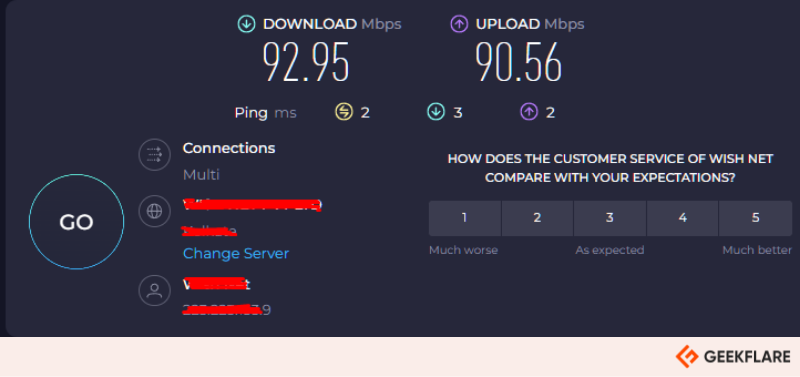
For reference, uploading the 211 MB MP4 file took 20.542 seconds to Azure West India region. For Dropbox, it took 28 seconds for the MP4 file, whereas smaller files such as PDF and PNG files are uploaded instantly without delay.
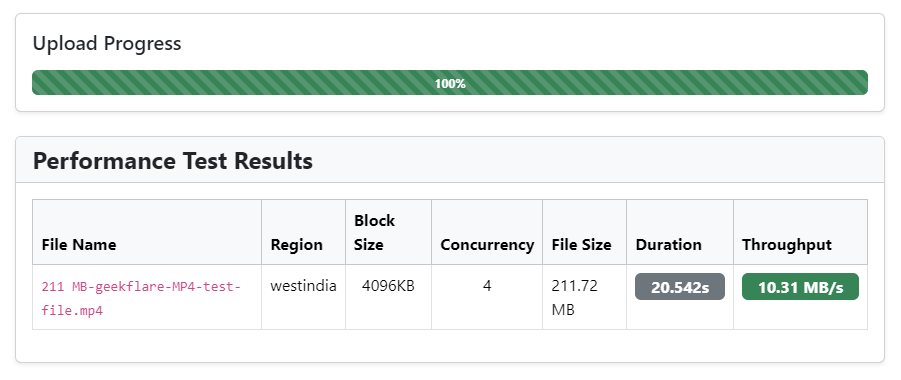
References
-
 EditorAnirban Choudhury is as an editor at Geekflare, bringing over 7 years of experience in content creation related to VPNs, Proxies, Hosting, Antivirus, Gaming, and B2B2C technologies.
EditorAnirban Choudhury is as an editor at Geekflare, bringing over 7 years of experience in content creation related to VPNs, Proxies, Hosting, Antivirus, Gaming, and B2B2C technologies.


